|
|
- " He [Doc] took his first real look at the woman he had saved. / "Thank you, sir," she began, as she turned her face to look up at him. / And what a face. Doc stopped breathing all over again. Her face had been hidden in shadow before, framed by that attractive bonnet. But then she smiled. / And what a smile. Doc thought it was like looking at the sun for the first time. / "—you saved my—" She paused as she, too, really looked at Doc. / She sighed the sweetest sigh Doc had ever heard. "—life," she concluded. / And what wonderful features surrounded that smile! That pert nose, that strong chin, those deep, large brown eyes that a man could get lost in — Doc sighed, then realized that, perhaps, he should say something in return. "
- —From Back to the Future Part III by Craig Shaw Gardner (quote, pages 98 and 99)
- "Clara was one in a million... One in a billion... One in a googolplex... The woman of my dreams, and I've lost her for all time."
- —Doc Brown
Clara Clayton-Brown is the tritagonist of the Back to the Future franchise, serving as the deuteragonist of Back to the Future Part III and the tritagonist of Back to the Future: The Animated Series. She was a schoolteacher, living and working in the schoolhouse outside Hill Valley in 1885. She met Dr. Emmett Brown and Marty McFly by chance when she was about to fall over Shonash Ravine.
Clara was a very independent woman and did not take much fuss from anyone, especially Buford "Mad Dog" Tannen. Clara did not like being lied to and believed that people should tell the truth. She often saved the day after coming up with ideas, she did however try and take actions that helped her or other people avoid dangerous situations in the first place.
Clara was a very intelligent woman. Like Doc, her favorite author was Jules Verne, and she was very interested in astronomy and science. One of her favorite possessions was her telescope, which she often used to look at the Moon and the stars; she also appeared to know where a lot of the constellations were. Clara was a thinker and most of the time thought things through. If she believed something to be too "wacky" or too fantastic to be believed, she would not believe it (such as when Doc tried telling her about the time machine); this, after her marriage to Doc, changed.
![Regreso Al Fururo III (Back To The Future III) [1990] –, 40% OFF](https://m.media-amazon.com/images/M/MV5BYzgzMDc2YjQtOWM1OS00ZjhhLWJiNjQtMzE3ZTY4MTZiY2ViXkEyXkFqcGdeQXVyNDQ0MTYzMDA@._V1_.jpg)
|
|
|
|
|
|
|
|
H. G. Wells
| H. G. Wells |

H. G. Wells en 1920
|
| Información personal |
| Nombre de nacimiento |
Herbert George Wells  |
| Nacimiento |
21 de septiembre de 1866 
Bromley (Reino Unido)  |
| Fallecimiento |
13 de agosto de 1946  (79 años) (79 años)
Londres (Reino Unido)  |
| Causa de muerte |
Tumor hepático  |
| Nacionalidad |
Británica |
| Lengua materna |
Inglés  |
| Familia |
| Padres |
Joseph Wells 
Sarah Neal  |
| Cónyuge |
Isabel Mary Wells
(1891-1894, divorciados)
Amy Catherine Robbins (1895-1927) |
| Pareja |
|
| Hijos |
George Phillip "G. P." Wells (1901-1985)
Frank Richard Wells (1903-1982)
Anna-Jane Blanco-White (1909-2010)
Anthony West (1914-1987) |
| Educación |
| Educación |
Doctor en Biología  |
| Educado en |
|
| Alumno de |
Thomas Henry Huxley  |
| Información profesional |
| Ocupación |
Escritor, historiador, periodista, idista, escritor de ciencia ficción, novelista, sociólogo y guionista  |
| Área |
Ciencia ficción, escritor, literatura de no ficción y literatura de ciencia ficción  |
| Años activo |
desde 1895 |
| Cargos ocupados |
Presidente de PEN Club Internacional (1932-1935)  |
| Movimiento |
Romanticismo |
| Seudónimo |
H. G. Wells, Reginald Bliss, Septimus Browne y Sosthenes Smith  |
| Géneros |
Ciencia ficción, biografía y ensayo  |
| Obras notables |
|
| Partido político |
Partido Laborista  |
| Miembro de |
Sociedad Fabiana  |
| Distinciones |
- Science Fiction and Fantasy Hall of Fame (1997)

|
| Firma |
 |
|
|
Herbert George Wells (Bromley; 21 de septiembre de 1866-Londres, 13 de agosto de 1946),1 más conocido como H. G. Wells, fue un escritor y novelista británico. Wells fue un autor prolífico que escribió en diversos géneros, como ciencia ficción, docenas de novelas, relatos cortos, obras de crítica social, sátiras, biografías y autobiografías. Es recordado por sus novelas de ciencia ficción y es frecuentemente citado como el «padre de la ciencia ficción» junto con Julio Verne y Hugo Gernsback.23
Sin embargo, durante su vida fue reconocido como un crítico social con visión de futuro, incluso profético, que dedicó sus talentos literarios al desarrollo de una visión progresista a escala global. En su faceta de futurista, escribió diversas obras utópicas y previó el advenimiento de aviones, tanques, viajes espaciales, armas nucleares, televisión por satélite y algo parecido a internet.4 En la ciencia ficción imaginó viajes en el tiempo, invasiones alienígenas, invisibilidad e ingeniería biológica. Entre sus obras más destacadas están La máquina del tiempo (1895), La isla del doctor Moreau (1896), El hombre invisible (1897), La guerra de los mundos (1898) y La guerra en el aire (1907). Estuvo nominado en cuatro ocasiones al Premio Nobel de Literatura.5
En un principio Wells estudió biología y sus ideas sobre cuestiones éticas se desenvolvieron en un contexto específica y fundamentalmente darwiniano.6 También fue siempre un abierto socialista que a menudo (aunque no siempre, como al comienzo de la Primera Guerra Mundial) simpatizó con posturas pacifistas. Sus obras posteriores fueron cada vez más políticas y didácticas, dejando de lado la ciencia ficción, mientras que a veces indicaba en documentos oficiales que su profesión era el periodismo.7 Novelas como Kipps o La historia de Mr. Polly, que describen la vida de la clase media-baja, llevaron a sugerir que era un digno sucesor de Charles Dickens,8 aunque Wells retrató numerosos estratos sociales e incluso intentó, en Tono-Bungay (1909), un diagnóstico del conjunto de la sociedad inglesa. Enfermo de diabetes, Wells cofundó en 1934 La Asociación Diabética (hoy conocido como Diabetes UK), de finalidad caritativa. Por sus escritos relacionados con la ciencia, en 1970 se decidió en su honor llamar H. G. Wells a un astroblema lunar ubicado en la cara oculta de la Luna.9
Nació en la Casa Atlas, High Street número 47, en Bromley, Kent, el 21 de septiembre de 1866,1 como el tercer hijo varón de Joseph Wells y su esposa Sarah Neal. La familia pertenecía a la empobrecida clase media-baja de la época. Tenían una tienda nada próspera comprada gracias a una herencia, en la que vendían productos deportivos y loza fina.10
En 1874 el joven Herbert George Wells vivió un hecho que tendría notables repercusiones en su futuro: sufrió un accidente que lo dejó en cama con una pierna quebrada. Para matar el tiempo, empezó a leer libros de la biblioteca local que le traía su padre. Se aficionó a la lectura y comenzó a desear escribir. Ese mismo año entró en una academia comercial llamada Thomas Morley's Commercial Academy, en la que continuó hasta 1880.1
En 1877 su padre sufrió un accidente que le impidió ganarse la vida como lo había hecho hasta entonces. Ello condujo a que Herbert y sus hermanos comenzaran a emplearse en diversos oficios. Fue así como, entre 1881 y 1883, llegó a ser aprendiz de una tienda de textiles llamada Southsea Drapery Emporium: Hyde's, experiencia que se ve reflejada en sus novelas The Wheels of Chance (1896) y Kipps: The Story of a Simple Soul (1905) cuyo protagonista es aprendiz textil.1 En 1883 se enroló en la escuela de gramática Midhurst de Sussex Occidental como alumno y tutor, donde continuó su avidez por la lectura.10
En 1884 obtuvo una beca para estudiar Biología en el Royal College of Science de Londres, donde tuvo como profesor a Thomas Henry Huxley. Estudió allí hasta 1887. Wells mismo, recordando esa época, habla de haber sufrido hambre constantemente.11 En este período también ingresa a un club de debate de la escuela llamado Debating Society, donde expresa su interés por transformar la sociedad. Formó parte de los fundadores de The Science School Journal, una revista en la que dio a conocer sus postulados en literatura y en temas sociales. Fue en ella que vio la luz por primera vez su novela La máquina del tiempo, pero con el título original: The Chronic Argonauts (Los Argonautas Crónicos).
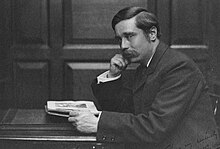 H. G. Wells mientras estudiaba en Londres (circa 1890).
Al suspender el examen de geología en 1887, perdió la beca. Por eso no fue sino hasta 1890 que recibió el título de grado en zoología del Programa Externo de la Universidad de Londres. Sin la beca, es decir, sin ingresos, se fue a vivir a casa de una pariente llamada Mary, prima de su padre, donde se interesó por la hija de ésta, Isabel. Entre 1889 y 1890 fue profesor de la Henley House School.1213 Fue uno de los fundadores de la Royal College of Science Association, siendo su primer presidente en 1909.11
Su relación con Rebecca West, que duró diez años, dio por fruto un hijo, Anthony West, nacido en 1914. Al contraer tuberculosis, abandonó todo para dedicarse a escribir; llegó a completar más de cien obras. Se le considera uno de los precursores de la ciencia ficción y sus primeras obras tuvieron ya por tema la fantasía científica, descripciones proféticas de los triunfos de la tecnología y comentarios sobre los horrores de las guerras del siglo xx: La máquina del tiempo (The Time Machine, 1895), su primera novela, de éxito inmediato, en la que se entrelazaban la ciencia, la aventura y la política; El hombre invisible (The Invisible Man, 1897); La guerra de los mundos (The War of the Worlds, 1898) y Los primeros hombres en la luna (The First Men in the Moon, 1901). Muchas de ellas dieron origen a varias películas.
A la vez se interesó por la realidad sociológica del momento, especialmente por la de las clases medias, defendiendo los derechos de los marginados y luchando contra la hipocresía imperante, que dibujó con cariño, compasión y sentido del humor en novelas como Love and Mr. Lewisham (1900), Kipps, the Story of a Simple Soul (1905) y Mr. Polly (1910), novela de extenso retrato de los personajes en la que, como en Kipps, describe con fina ironía el fracaso de las aspiraciones sociales de sus protagonistas.
La gran mayoría de sus restantes libros pueden clasificarse como novelas sociales. Entre ellas se encuentran Ana Verónica (Ann Veronica 1909), en la que defiende los derechos de las mujeres, Tono Bungay (1909), un ataque al capitalismo irresponsable, y Mr. Britling va hasta el fondo (1916), que describe la reacción del inglés medio ante la guerra. Después de la Primera Guerra Mundial (1914-1918), redactó la historia de la humanidad en tres partes, Outline of History (1920), en la que colaboró Julian Huxley.
 H. G. Wells en 1943.
|
|
|
|
|

   


       

New International VersionIt is as if the dew of Hermon were falling on Mount Zion. For there the LORD bestows his blessing, even life forevermore.
New Living TranslationHarmony is as refreshing as the dew from Mount Hermon that falls on the mountains of Zion. And there the LORD has pronounced his blessing, even life everlasting.
English Standard VersionIt is like the dew of Hermon, which falls on the mountains of Zion! For there the LORD has commanded the blessing, life forevermore.
Berean Standard BibleIt is like the dew of Hermon falling on the mountains of Zion. For there the LORD has bestowed the blessing of life forevermore.
King James BibleAs the dew of Hermon, and as the dew that descended upon the mountains of Zion: for there the LORD commanded the blessing, even life for evermore.
New King James VersionIt is like the dew of Hermon, Descending upon the mountains of Zion; For there the LORD commanded the blessing— Life forevermore.
New American Standard BibleIt is like the dew of Hermon Coming down upon the mountains of Zion; For the LORD commanded the blessing there—life forever.
NASB 1995It is like the dew of Hermon Coming down upon the mountains of Zion; For there the LORD commanded the blessing— life forever.
NASB 1977It is like the dew of Hermon, Coming down upon the mountains of Zion; For there the LORD commanded the blessing—life forever.
Legacy Standard BibleIt is like the dew of Hermon Coming down upon the mountains of Zion; For there, Yahweh commanded the blessing—life forever.
Amplified BibleIt is like the dew of [Mount] Hermon Coming down on the hills of Zion; For there the LORD has commanded the blessing: life forevermore.
Christian Standard BibleIt is like the dew of Hermon falling on the mountains of Zion. For there the LORD has appointed the blessing — life forevermore.
Holman Christian Standard BibleIt is like the dew of Hermon falling on the mountains of Zion. For there the LORD has appointed the blessing— life forevermore.
American Standard VersionLike the dew of Hermon, That cometh down upon the mountains of Zion: For there Jehovah commanded the blessing, Even life for evermore.
Contemporary English VersionIt is like the dew from Mount Hermon, falling on Zion's mountains, where the LORD has promised to bless his people with life forevermore.
English Revised VersionLike the dew of Hermon, that cometh down upon the mountains of Zion: for there the LORD commanded the blessing, even life for evermore.
GOD'S WORD® TranslationIt is like dew on [Mount] Hermon, dew which comes down on Zion's mountains. That is where the LORD promised the blessing of eternal life.
Good News TranslationIt is like the dew on Mount Hermon, falling on the hills of Zion. That is where the LORD has promised his blessing--life that never ends.
International Standard VersionIt is like the dew of Hermon falling on Zion's mountains. For there the LORD commanded his blessing— life everlasting.
Majority Standard BibleIt is like the dew of Hermon falling on the mountains of Zion. For there the LORD has bestowed the blessing of life forevermore.
NET BibleIt is like the dew of Hermon, which flows down upon the hills of Zion. Indeed that is where the LORD has decreed a blessing will be available--eternal life.
New Heart English Biblelike the dew of Hermon, that comes down on the hills of Zion: for there the LORD gives the blessing, even life forevermore.
Webster's Bible TranslationAs the dew of Hermon, and as the dew that descended upon the mountains of Zion: for there the LORD commanded the blessing, even life for ever.
World English Biblelike the dew of Hermon, that comes down on the hills of Zion; for there Yahweh gives the blessing, even life forever more.
Literal Translations
Literal Standard VersionAs dew of Hermon—That comes down on hills of Zion, "" For there YHWH commanded the blessing—Life for all time!
Young's Literal TranslationAs dew of Hermon -- That cometh down on hills of Zion, For there Jehovah commanded the blessing -- Life unto the age!
Smith's Literal TranslationAs the dew of Hermon coming down upon the mountains of Zion: for there Jehovah commanded the blessing, life even forever.
Catholic Translations
Douay-Rheims Bibleas the dew of Hermon, which descendeth upon mount Sion. For there the Lord hath commandeth blessing, and life for evermore.
Catholic Public Domain VersionIt is like the dew of Hermon, which descended from mount Zion. For in that place, the Lord has commanded a blessing, and life, even unto eternity.
New American BibleLike dew of Hermon coming down upon the mountains of Zion. There the LORD has decreed a blessing, life for evermore!
New Revised Standard VersionIt is like the dew of Hermon, which falls on the mountains of Zion. For there the LORD ordained his blessing, life forevermore.
Translations from Aramaic
Lamsa BibleLike the dew of Hermon that falls upon the mount of Zion; for there the LORD commanded the blessing, even life for evermore.
Peshitta Holy Bible TranslatedLike the dew of Hermon that descends upon the mountain of Zion, because there LORD JEHOVAH commanded the blessing and the Life unto eternity.
OT Translations
JPS Tanakh 1917Like the dew of Hermon, That cometh down upon the mountains of Zion; For there the LORD commanded the blessing, Even life for ever.
Brenton Septuagint TranslationAs the dew of Aermon, that comes down on the mountains of Sion: for there, the Lord commanded the blessing, even life for ever.
Additional Translations ...
|
 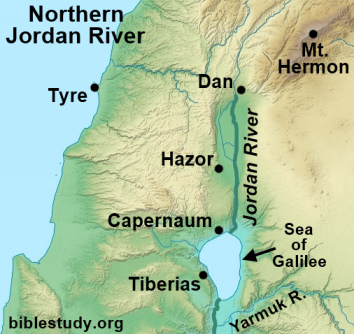     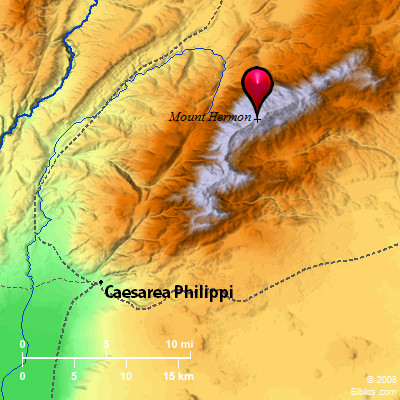 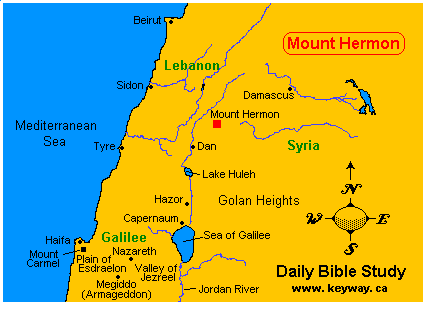     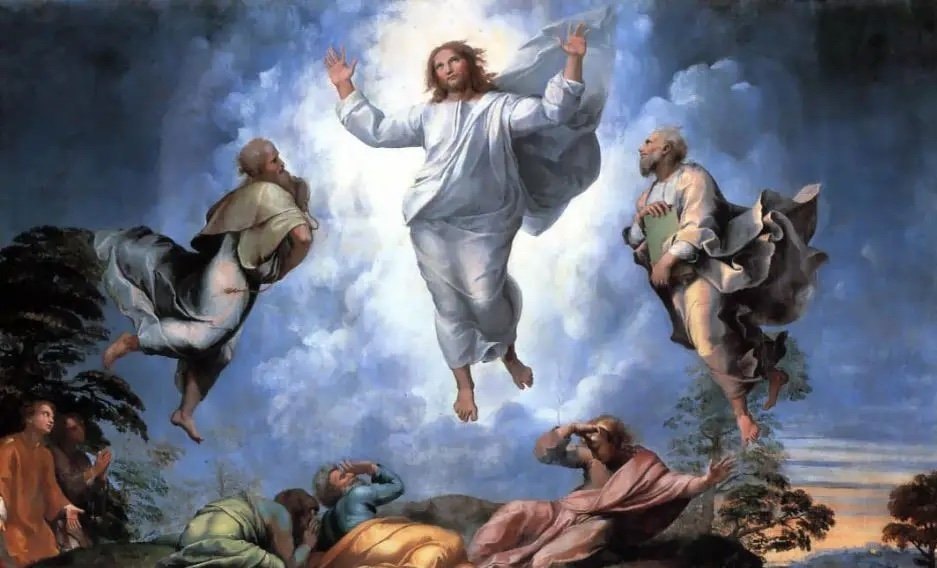    
|
|
|
|
|
In Back to the Future: Part 3, Doc Brown names his kids Jules and Verne, after Jules Verne, who wrote nothing about time travel in his works. The science fiction author he was thinking of was H.G. Wells, who wrote The Time Machine.
|
|
|
|
|
|
|
| , MA History, BA History

Jesus Christ had twelve disciples, each of whom accompanied the Biblical savior during His time on earth. Many of them continued His Christian work after the ascension. The twelve men were Peter, James (Jesus’ brother), John, Andrew, Philip, Judas Iscariot (who betrayed Jesus, and was replaced by Matthias), Matthew, Thomas, James, the son of Alpheus, Bartholomew, Judas Thaddeus; and Simon the Zealot. Of them all, Saint James, also known as James, brother of Jesus, James, son of Alpheus, James the Lesser, James the Minor, and James the Just, was one of the most prominent and significant.
James, Son of Alphaeus, James the Greater, and James, the Brother of Jesus
 St James the Minor, Peter Paul Rubens, 1613. Source: Wikipedia St James the Minor, Peter Paul Rubens, 1613. Source: Wikipedia
Various Gospels are often ambiguous, at times, as to which James is being referenced. Two to three James’s are spoken of in the Gospels – James, brother of John (aka James the Greater); James, brother of Jesus, and James, son of Alphaeus. The Catholic doctrine of the perpetual virginity of Mary holds that James the son of Alpheus and James, brother of Jesus are the same person, as James could not be Jesus’ physical full brother. In Protestant readings, the two are separate. If the two are separate, then very little is known regarding James, son of Alpheus.
James, Brother of Jesus
 Statue of St. James the Less in the Archbasilica of St. John Lateran by Angelo de Rossi. Source: Wikipedia Statue of St. James the Less in the Archbasilica of St. John Lateran by Angelo de Rossi. Source: Wikipedia
James, the brother of Jesus, was a follower and Disciple of Jesus Christ during His earthly ministry and one of the first leaders of the early Christian Church. He remained in Jerusalem as leader of the church following the death, burial, resurrection, and ascension of Jesus, and was likely martyred at the temple in Jerusalem.
James’ Position in the Early Church
 St. James the Minor, by Georges de la Tour, 1615-20. Source: Wikipedia St. James the Minor, by Georges de la Tour, 1615-20. Source: Wikipedia
Get the latest articles delivered to your inbox
Sign up to our Free Weekly Newsletter
In Acts 15, a Council in Jerusalem was held regarding circumcision over which James presided. The Acts 15 Council is considered probably the first Christian council, where many Apostles congregated to discuss the matter brought by Paul and Barnabas. In Galatians 1, the Apostle Paul records a meeting with James in the process of Paul confirming his conversion to the other Apostles. James may have been the first elected leader within the early church. Through the writings of Eusebius in the 200s, we have the records of Clement of Alexandria from the second century that James was elected leader of the Jerusalem Church.
St James Was Martyred
 Saint James the Less (Menologion of Basil II). Source: The Byzantine Life Saint James the Less (Menologion of Basil II). Source: The Byzantine Life
The death of James the Just around 62 CE is recorded by Eusebius, Clement of Alexandria, and Josephus. Eusebius copied the chronicles of an earlier Christian, Hegesippus, who wrote that James was martyred by being thrown from the pinnacle of the temple in Jerusalem, and beaten with a club when the fall did not kill him.
Non-canonical Writings Attributed to Saint James
 The Protoevangelium of James, James Orr. Source: Rakuten Kobo The Protoevangelium of James, James Orr. Source: Rakuten Kobo
The Gospel of James, also known as The Protoevangelium of James, is a book of unknown source that was being circulated within the second century church. Both Origen and Clement of Alexandria reference the book in their writings, so it was at least written around that time. The Gospel of James contains the first mention of the idea of the perpetual virginity of Mary, the mother of Jesus. The book was condemned by Pope Innocent I in 405, and it has generally not been accepted throughout church history as canonical due to its late writing and inconstant content.
The First and Second Apocalypse of James and the Apocryphon of James are other 2nd century books whose author claimed to be James. Each of these books were from a collection of gnostic (secret knowledge) texts found in Egypt in 1945. In addition to an authorship too late to be James, they are also part of gnostic texts written in an attempt to legitimize the early movement within Christianity.
James, the Son of Alphaeus
 Two Martyr Saints in an Initial S (Alphaeus and Zacchaeus), 14th century. Source: Victoria and Albert Museum Two Martyr Saints in an Initial S (Alphaeus and Zacchaeus), 14th century. Source: Victoria and Albert Museum
James the son of Alphaeus, while mentioned in the listings of the apostles, has very few details known regarding his life. Outside of being listed among the apostles, and described in the Gospel of Mark as “the lesser” or “the smaller,” he is barely mentioned in the Bible. Several early Christian writings attempt to identify him with James the Just, but most try to maintain the perpetual virginity of Mary in a complex manner. It is speculated that he died as a martyr by crucifixion in Ostrakine, Egypt.
https://www.thecollector.com/who-was-saint-james-brother-of-jesus/ |
|
|
|
|
|
 Primer Primer
 Anterior
56 a 70 de 70
Siguiente Anterior
56 a 70 de 70
Siguiente
 Último
Último

|








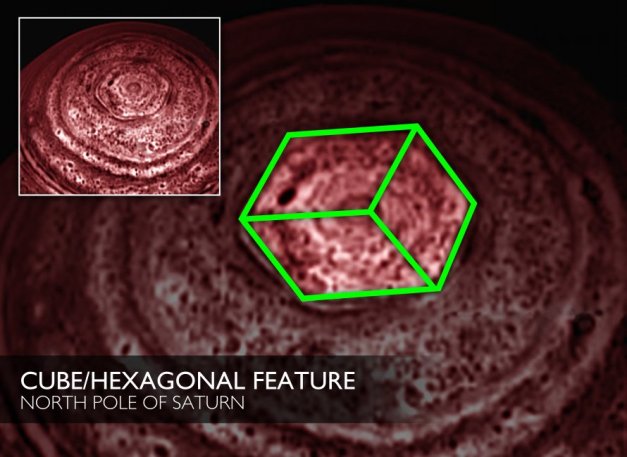



















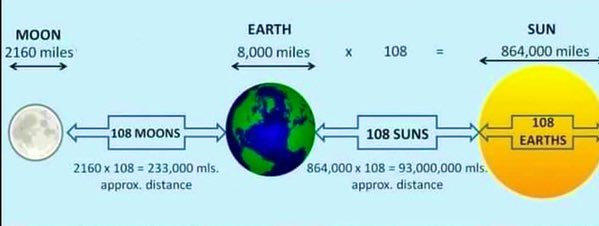



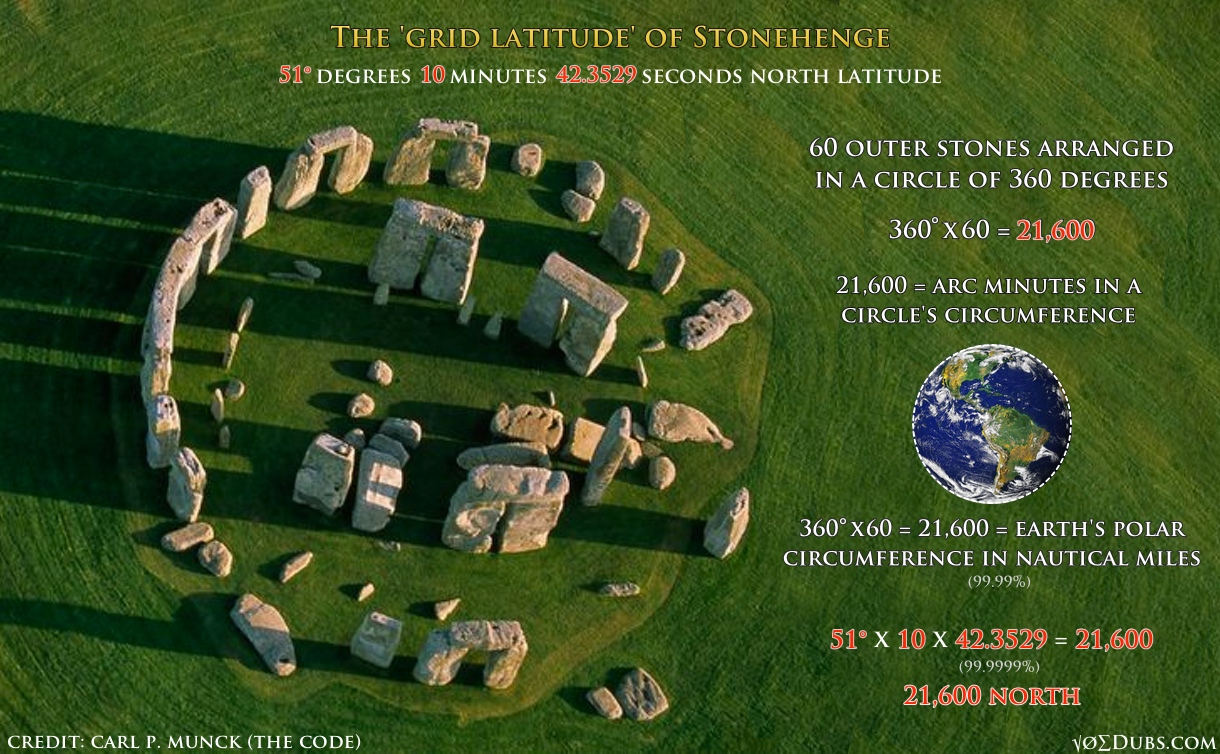



![Regreso Al Fururo III (Back To The Future III) [1990] –, 40% OFF](https://m.media-amazon.com/images/M/MV5BYzgzMDc2YjQtOWM1OS00ZjhhLWJiNjQtMzE3ZTY4MTZiY2ViXkEyXkFqcGdeQXVyNDQ0MTYzMDA@._V1_.jpg)
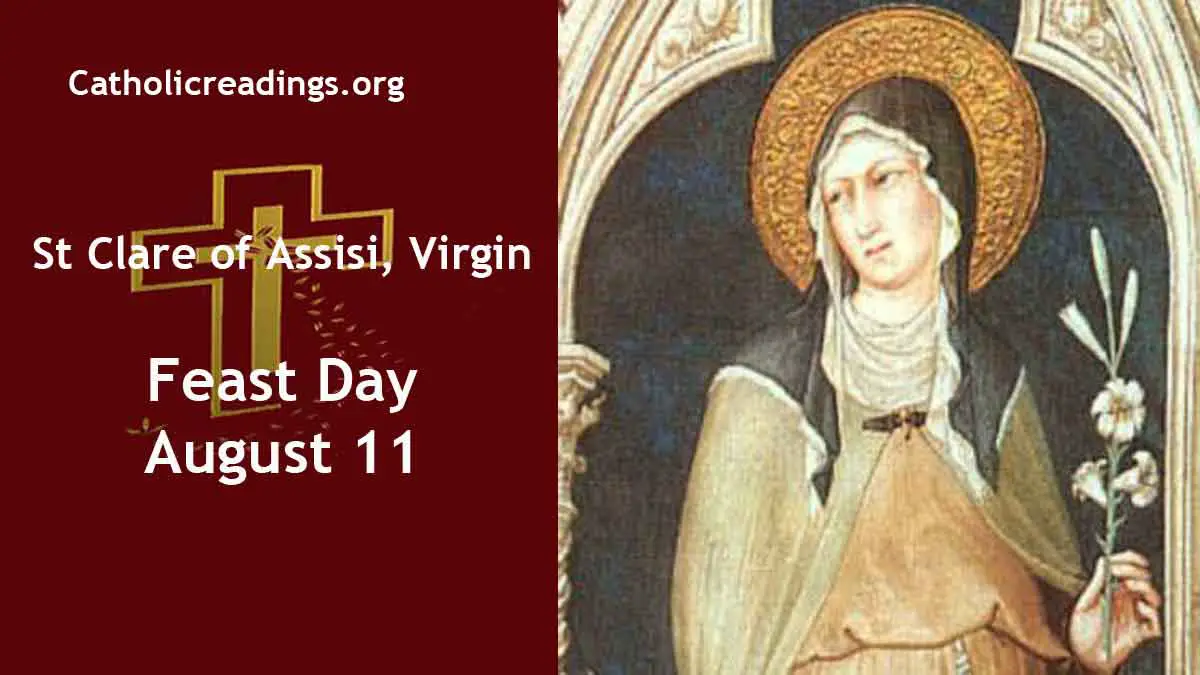




























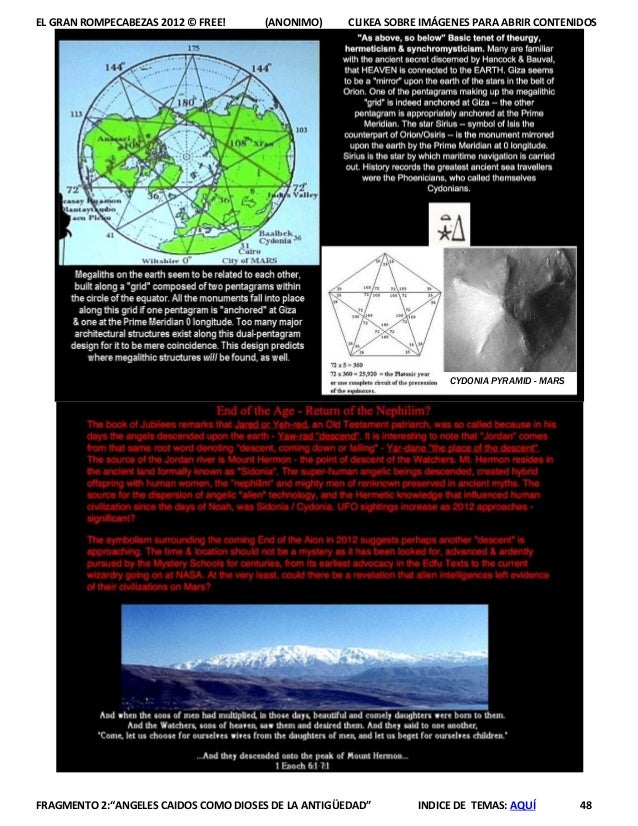
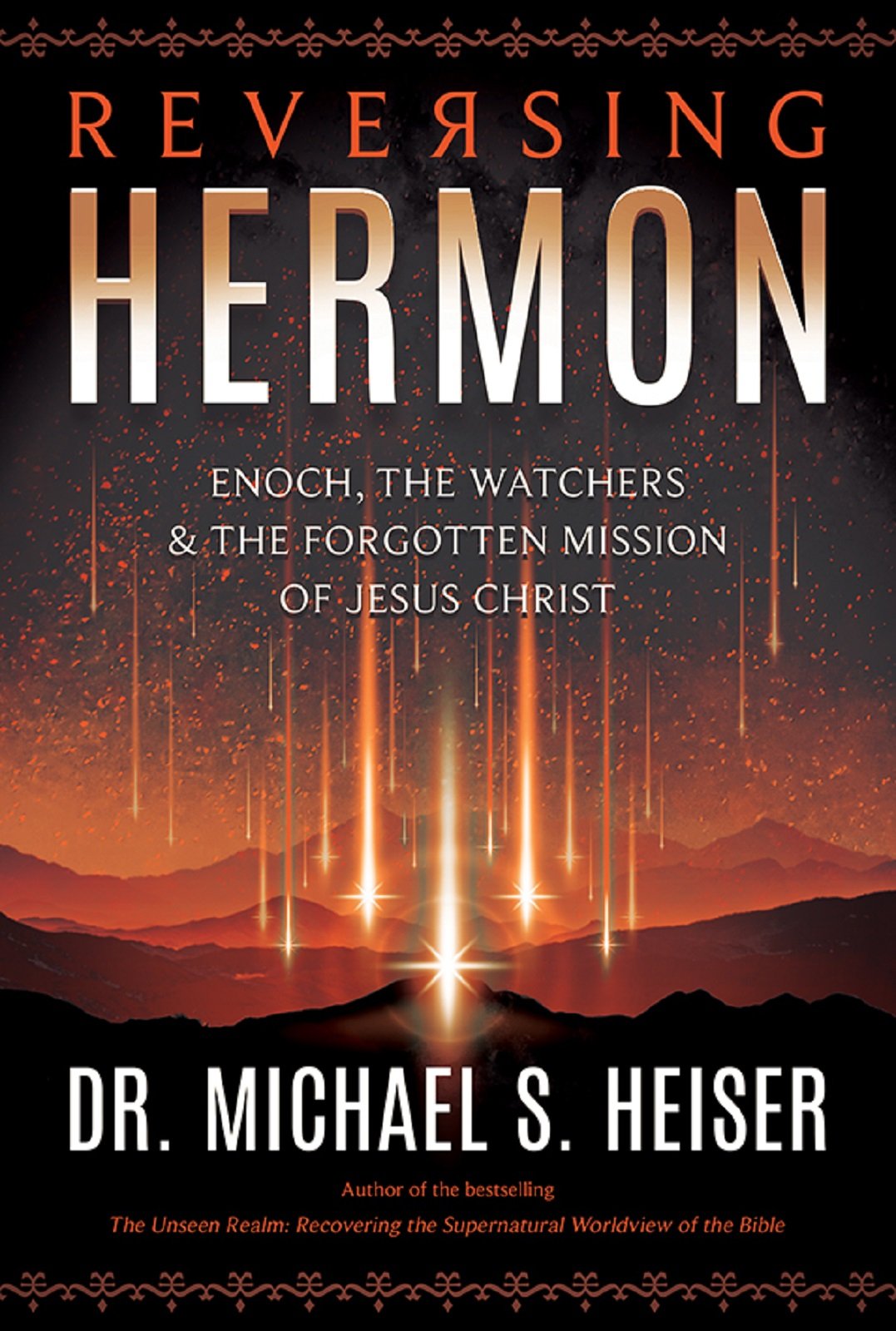



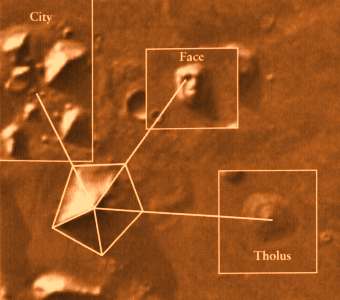

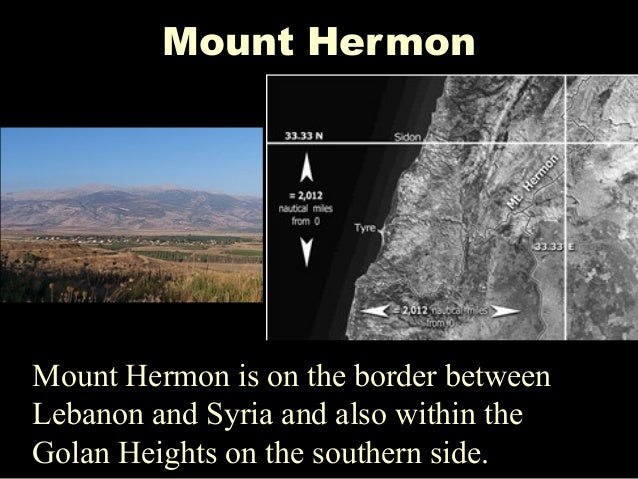






![Revelation 1:14 (lsv) - and His head and hairs [were] white, as if ...](https://img2.bibliaya.com/Bibleya/verse/revelation-1-14-lsv.jpg)

























































